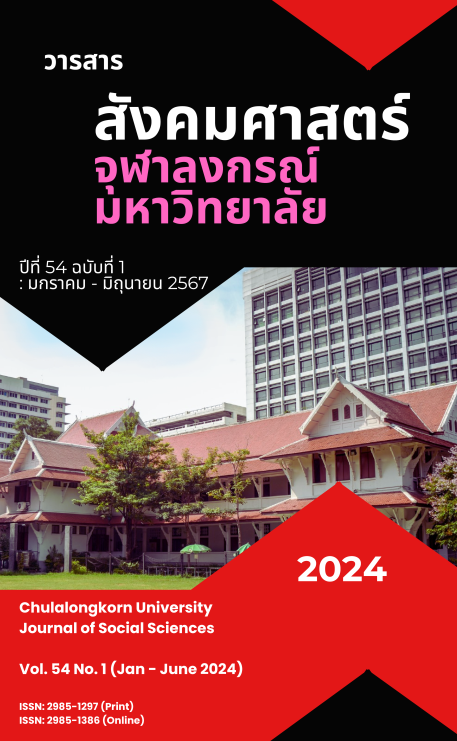The Electoral Authoritarianism: Concept, Elections Under Authoritarianism and Authoritarian Manipulation
DOI:
https://doi.org/10.61462/cujss.v54i1.2520Keywords:
Democratization, Mixed Regime, Electoral Authoritarianism, Election, ManipulationAbstract
This article explores the concept of "electoral authoritarianism." This concept describes the political regimes after "the third wave of democratization" that do not fall in the transitional paradigm but rather can be characterized as an authoritarian regime with multi-party elections and democratic political institutions. The article discusses how elections, which generally serve as fundamental democratic mechanisms, are utilized by authoritarianism to build legitimacy and acceptance among both domestic and international communities. Finally, the article explores how authoritarian rulers manipulate elections and democratic political institutions to maintain their power.
Downloads
References
Attasit Pankaew. 2021. “Phakkanmueang Lae Kan Luektung.” [Political Parties and Elections.] In Kanmueang Amnat Khwamru: Lak Ratthasat Bueangton Samnak Thammasat. [The Politics, Power, Knowledge: Basic Principles of Political Science, Thammasat University], edited by Prajak Kongkirati, 273-306, Bangkok: Siamparitut. (in Thai)
Britannica. 2021. “Functions of elections.” Accessed October 14, 2023. https://www.britannica.com/topic/election-political-science/Functions-of-elections
Carothers, Thomas. 2002. “The End of the Transition Paradigm.” Journal of Democracy 13 (1): 5-21. https://doi.org/10.1353/jod.2002.0003
Case, William. 2006. “Manipulative Skills: How Do Rulers Control the Electoral Arena?” In Electoral Authoritarianism: The Dynamics of Unfree Competition, edited by Andreas Schedler, 93–112. Boulder, Colorado: Lynne Rienner Publishers. https://doi.org/10.1515/9781685857479-008.
Collier, David, and Steven Levitsky. 1997. “Democracy with Adjectives: Conceptual Innovation in Comparative Research.” World Politics 49 (3): 430–51. https://doi.org/10.1353/wp.1997.0009.
Diamond, Larry. 2002. “Elections Without Democracy: Thinking About Hybrid Regimes.” Journal of Democracy 13 (2): 21–35. https://doi.org/10.1353/jod.2002.0025.
Gandhi, Jennifer, and Ellen Lust-Okar. 2009. “Elections Under Authoritarianism.” Annual Review of Political Science 12 (1): 403–22. https://doi.org/10.1146/annurev.polisci.11.060106.095434.
Huntington, Samuel P. 1991. The Third Wave: Democratization in the Late Twentieth Century. The Julian J. Rothbaum Distinguished Lecture Series, Vol. 4. Norman, Oklahoma: University of Oklahoma Press.
Levitsky, Steven, and Lucan A. Way. 2002. “Elections Without Democracy: The Rise of Competitive Authoritarianism.” Journal of Democracy 13 (2): 51–65. https://doi.org/10.1353/jod.2002.0026.
Levitsky, Steven, and Lucan A. Way. 2010. Competitive Authoritarianism: Hybrid Regimes after the Cold War. Reissue edition. Cambridge: Cambridge University Press.
Morgenbesser, Lee. 2014. “Elections in Hybrid Regimes: Conceptual Stretching Revived.” Political Studies 62 (1): 21–36. https://doi.org/10.1111/1467-9248.12020.
Prajak Kongkirati and Veerayooth Kanchoochat. 2018. “The Prayuth Regime: Embedded Military and Hierarchical Capitalism in Thailand.” TRaNS: Trans-Regional and -National Studies of Southeast Asia 6 (2): 279–305. https://doi.org/10.1017/trn.2018.4.
Prajak Kongkirati. 2021. “Rabop Prachathippatai Lae Rabop Thi Mai Chai Prachathippatai : Kansueksa Rabop Kanmueang Choeng Priapthiap. [Democracy and Non-Democracy: A Comparative Study of Political Regimes.”] In Kanmueang Amnat Khwamru: Lak Ratthasat Bueangton Samnak Thammasat. [The Politics, Power, Knowledge: Basic Principles of Political Science, Thammasat University]. edited by Prajak Kongkirati, 145-84, Bangkok: Siamparitut. (in Thai)
Schedler, Andreas. 2002. “Elections Without Democracy: The Menu of Manipulation.” Journal of Democracy 13 (2): 36–50. https://doi.org/10.1353/jod.2002.0031
Schedler, Andreas. 2006. “The Logic of Electoral Authoritarianism.” In Electoral Authoritarianism: The Dynamics of Unfree Competition, edited by Schedler, Andreas, 1-23. Boulder, Colorado: Lynne Rienner Publishers. https://doi.org/10.1515/9781685857479-003
Schedler, Andreas. 2013a. The Politics of Uncertainty: Sustaining and Subverting Electoral Authoritarianism. New York: Oxford University Press. https://doi.org/10.1093/acprof:oso/9780199680320.001.0001.
Schedler, Andreas. 2013b. “Emerging Trends in the Study of Electoral Authoritarianism.” http://repositorio-digital.cide.edu//handle/11651/1412.
Yoshifumi, Tamada. 2008. “Prachathippatai, Kan Thamhai Pen Prachathippatai, Lae Kan Ok Chak Prachathippatai Khong Prathet Thai.” [Democracy, Democratization and De-Democratization in Thailand] Samesky 6 (4): 98-139. (in Thai).
Downloads
Published
How to Cite
Issue
Section
License
Copyright (c) 2024 Faculty of Political Science, Chulalongkorn University

This work is licensed under a Creative Commons Attribution-NonCommercial-NoDerivatives 4.0 International License.
Public Licensing Terms
Copyright and Licensing Policy
The Chulalongkorn University Journal of Social Science publishes all content under the Creative Commons Attribution-NonCommercial-NoDerivatives 4.0 International License (CC BY-NC-ND 4.0).
Copyright
All published articles in the Chulalongkorn University Journal of Social Science are the copyright of the Faculty of Political Science, Chulalongkorn University. Authors transfer all rights to the journal upon acceptance of their manuscript for publication.
CC BY-NC-ND 4.0 License
Under this license:
-
Attribution (BY): Users must give appropriate credit to the authors, the Faculty of Political Science, Chulalongkorn University, and the Chulalongkorn University Journal of Social Science, provide a link to the license, and indicate if changes were made. They may do so in any reasonable manner, but not in any way that suggests the licensor endorses them or their use.
-
NonCommercial (NC): Users may not use the material for commercial purposes. Commercial use requires prior written permission from both the authors and the Faculty of Political Science, Chulalongkorn University.
-
NoDerivatives (ND): If users remix, transform, or build upon the material, they may not distribute the modified material. Adaptations of the work require prior written permission from both the authors and the Faculty of Political Science, Chulalongkorn University.
Open Access Statement
The Chulalongkorn University Journal of Social Science provides immediate open access to its content on the principle that making research freely available to the public supports a greater global exchange of knowledge. Users are allowed to read, download, copy, distribute, print, search, or link to the full texts of the articles without asking prior permission from the publisher or the author, in accordance with the CC BY-NC-ND 4.0 license.
Self-Archiving Policy
Authors may archive the final published version, preprints, or postprints of their articles in institutional repositories or on their personal websites, provided that they acknowledge the original publication in the Chulalongkorn University Journal of Social Science with a complete citation and a link to the journal's website.
Permissions
For any use beyond those covered by the CC BY-NC-ND 4.0 license, please contact:
Editorial Office
Chulalongkorn University Journal of Social Science
Faculty of Political Science, Chulalongkorn University
Email: cusocscij@gmail.com
For more information about the Creative Commons Attribution-NonCommercial-NoDerivatives 4.0 International License, please visit: https://creativecommons.org/licenses/by-nc-nd/4.0/





